
More boosters are approved, kids’ shots prove effective, and more countries open up. Here’s what you should know:
Want to receive this weekly roundup and other coronavirus news? Sign up here!
Headlines
The FDA and CDC approve Moderna and J&J boosters
Yesterday, the US Centers for Disease Control and Prevention endorsed boosters for eligible people who received initial doses of the Moderna or Johnson & Johnson vaccines, which means that tens of millions more Americans can get an additional shot as soon as today. The agency’s approval followed similar authorization from the FDA the day prior. The FDA, and later the CDC, also said that people who are eligible for boosters can get them from a different drugmaker than their first shots. There’s some evidence to show that any extra dose increases immunity, and in particular that people who got a first shot from Johnson & Johnson had a much better immune response if they got a second dose of an mRNA vaccine. The FDA said anyone who got a Johnson & Johnson shot is eligible for a booster two months after their initial vaccination.
Already, there are more boosters than first doses being administered in the US. But some medical ethicists and international organizations continue to voice their dismay with the way the US has prioritized eradicating any infection within its own borders over helping other countries secure initial doses, thereby reducing severe illness and death worldwide.
Pfizer and BioNTech submit data to the FDA demonstrating their vaccine’s efficacy in kids
Pfizer and BioNTech submitted data to the FDA today showing that their Covid-19 vaccine proved 90.7 percent effective at preventing symptomatic disease in children ages 5 to 11 during clinical trials. Participants received one-third of the adult dosage and saw only mild side effects. There were no cases of severe illness or myocarditis or pericarditis, heart conditions that have been seen in some other age groups of vaccine recipients, notably young men. Earlier this week the White House outlined its plan for distributing shots to kids once they’re approved, which could happen within weeks. The administration will partner with pediatricians’ offices and community clinics, among other health care providers, and will focus on educating parents about the shots.
Pfizer and BioNTech also filed with Health Canada for approval of their vaccine in younger kids this week. When it comes to vaccinating adolescents, Canada has been an exemplar. It was the first country to approve shots for kids ages 12 to 15 last spring, and more than 80 percent of Canadians 12 and older are fully inoculated.
Countries around the world ease restrictions for vaccinated residents and tourists
On Friday, Melbourne, Australia’s second-largest city, reopened after being locked down for 262 days, the longest cumulative lockdown for any city in the world during the pandemic. It follows in the footsteps of Sydney, where restrictions began easing two weeks ago. Starting next month, fully vaccinated international travelers will no longer need to quarantine when entering the two cities. In neighboring New Zealand, Prime Minister Jacinda Ardern said that country’s lockdown will end when 90 percent of eligible residents are vaccinated; so far, 86 percent of the population has received at least one dose. Kuwait also announced it will lift restrictions for people who’ve been vaccinated. And Thailand has said it will open up to visitors who’ve received their shots.
